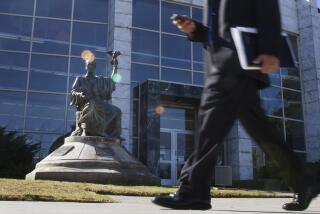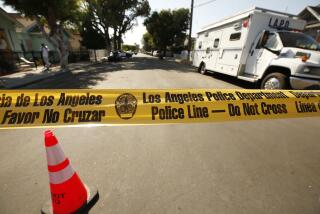Tearful Jewell Describes 3-Month ‘Nightmare’
- Share via
ATLANTA — Alternately weepy and admonishing, Richard Jewell willingly faced a barrage of television cameras for the first time Monday, describing the “nightmare” of the last three months and lashing out at the FBI and the news media, which he said almost destroyed his life.
The 33-year-old security guard was cleared of suspicion by the Justice Department over the weekend in the July 27 pipe bomb explosion in Centennial Olympic Park. But the government letter exonerating him “cannot give me back my good name or my reputation,” said Jewell, reading from a prepared statement.
For the last three months, he spent every waking minute “fearing that I could be arrested and charged with a horrible crime, a crime I did not commit,” he said. “For 88 days I lived a nightmare.”
When he learned he was a suspect, the man who earlier had been hailed as a hero for spotting the bomb said: “I felt numb, sick. I was in shock and felt helpless. . . .
“As the days passed I kept waiting for the FBI to uncover the evidence that would point them in the right direction,” he said. “It did not happen because they were looking in the wrong direction. They were still looking at me.”
The FBI has declined to speak on the record about the investigation. Law enforcement sources say, however, that the agency now is looking at a number of suspects but has no direct evidence linking any of them to the bombing, which killed one person and injured more than 100 when it exploded in the park that was Atlanta’s central gathering place during the Olympic Games.
At the Monday news conference, Jewell’s lawyers bitterly attacked law enforcement and the media for disrupting Jewell’s life, and charged that the FBI used devious investigative methods.
Affidavits supporting FBI search warrants, which were released Monday, show that agents relied on circumstantial evidence. This included witness statements about Jewell’s behavior before and after the bombing; information about his difficulties in past law enforcement and security jobs; and testimony from acquaintances that he “ate, slept and breathed” his job, liked reading and talking about “cop stuff” and had received previous bomb training.
Lin Wood, one of Jewell’s attorneys, said Jewell’s bomb training was geared to how to spot bombs and what to do after spotting them. He called the affidavits “full of half-truths, distorted facts and slanted information.”
“Every American ought to be scared to death about how little it takes for the American government to search you and seize your property,” said G. Watson Bryant, another Jewell attorney.
“I am more afraid of the FBI than I am of being blown up in some park someplace by some lone bomber,” he said. “They are the people who scare the hell out of me.”
The attorneys also criticized the agency’s tactics, which included secretly taping a conversation about the bombing between Jewell and Tim Attaway, a Georgia Bureau of Investigation agent and friend of Jewell. When Attaway called Jewell two days after the bombing to discuss what had happened, Jewell invited him over for a lasagna dinner, Wood said. The transcript of their conversation ran more than 120 pages.
The next afternoon, the FBI asked Jewell to come to its offices under the guise of helping make a training film about finding suspicious packages, Jewell’s attorneys charged.
A partial transcript of the meeting released by Jewell’s attorneys shows that he discussed his background with the agents, including incidents in his past career as a sheriff’s deputy and security guard.
A senior Justice Department official who declined to be identified acknowledged Monday that unusual tactics were used in handling Jewell. “You’re damned if you do and damned if you don’t,” he said.
More than an hour into the videotaping, the lawyers said, FBI Special Agent Don Johnson told Jewell he wanted to run through the interview again, only this time, he said, “I’m even going to go as far as to advise you of your rights. OK?”
He presented Jewell with a form advising him of his rights and asked him to sign it. That’s when the security guard grew suspicious and said he wanted his lawyer.
Johnson questioned why he needed an attorney, according to the transcript. “It is my understanding that you are a hero,” he said.
While this was going on, Bryant, a longtime friend, had begun frantically trying to reach Jewell after seeing a special edition of the Atlanta Journal-Constitution that called the security guard the FBI’s primary suspect.
When he first telephoned the FBI, Bryant said, he was told Jewell wasn’t there. Jewell had left a message on the lawyer’s answering service, however. After using the caller identification service on his phone, Bryant said he learned Jewell definitely had placed the call from FBI offices. He called the agency again and this time demanded to speak to Jewell.
When Jewell came on the line, Bryant said he told him to “get your butt out of that building.”
“I do not have the words to describe how low my opinion is of the way they treated this man,” Bryant said.
Sources in Washington said top Justice Department officials--including Atty. Gen. Janet Reno--personally “signed off” on the letter exonerating Jewell before it was given to him and his lawyers on Saturday.
Although such letters are rare, they are sometimes given to individuals who have become publicly known and their reputations possibly tarnished.
“Certainly, we were unhappy with the way the public spotlight shined on him,” a Justice Department source said, adding that a press release issued by U.S. Atty. Kent Alexander in Atlanta on Saturday, which used the word “regret,” is probably as close as authorities will come to apologizing.
Lawyers for Jewell said they are considering suing the agency for illegal search and seizure although they acknowledge that winning such a lawsuit may be difficult.
The lawyers said they definitely will file lawsuits in coming weeks against the Atlanta Journal-Constitution and NBC News, which they said disseminated false information about Jewell implying that he was guilty. Wood also criticized the ethics of other media organizations that published Jewell’s name even though he had not been charged, but acknowledged that Jewell probably has no grounds for a lawsuit against those organizations.
Jewell, too, had harsh words for the news media: “Let the headlines be based on facts,” he said. “Don’t shape the facts to make the headlines. . . .
“In its rush for the headline that the hero was the bomber, the media cared nothing for my feelings as a human being. In their mad rush to fulfill their own personal agendas, the FBI and the media almost destroyed me and my mother . . .
“I felt like a hunted animal, followed constantly, waiting to be killed,” he said of the 24-hour surveillance by both the FBI and the media.
While reading his statement, Jewell cried when he thanked his mother “for standing by and believing in me.” Then he tearfully thanked his attorneys, particularly Bryant, whom he said had been “like a brother” during the ordeal.
His voice cracked again when he talked about the bombing itself. “When the explosion occurred, I saw my fellow officers and friends flying through the air,” he said.
Jewell, who said he hopes to return to police work, said he does not consider himself a hero.
“The bomb technician who crawled on his belly and got next to the bomb was a hero,” he said. “The officers who took the shrapnel by placing their bodies between the bomb and where the people were in the park were the heroes. The paramedics and firemen who responded so quickly and treated the injured were the heroes. . . .
“All I did was my job,” he said.
Times staff writer Richard Serrano in Washington contributed to this story.
* LESSON FROM ATLANTA: Howard Rosenberg says the media have a lot to learn from the Jewell incident. F1
More to Read
Go beyond the scoreboard
Get the latest on L.A.'s teams in the daily Sports Report newsletter.
You may occasionally receive promotional content from the Los Angeles Times.







